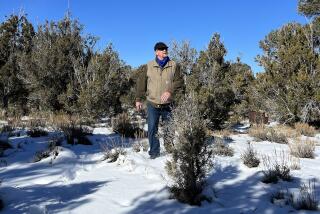Tapping Cow Output to Lower Car Output
- Share via
Forget horse power: Think cows.
Some scientists here and abroad believe that cow manure could produce a clean, environmentally friendly form of natural gas to fuel some of California’s 30 million passenger vehicles.
The theory is being tested by the California-Sweden Biogas Initiative, a venture between CalStart, a Pasadena nonprofit that promotes advanced transportation technologies, and the Swedish group Business Region Goteborg.
Biogas is methane extracted from manure, agricultural crop wastes, municipal sewage or slaughterhouse leavings that are treated to remove impurities and then liquefied or compressed as a gas. It’s transported through natural gas pipelines and sold through the same retail and commercial outlets that supply compressed natural gas to heavy trucks and the few passenger vehicles equipped to run on CNG.
In California, there are several small biogas plants, but the stuff is used to produce electricity that is generally consumed by farmers and ranchers who own the plants.
However, in Sweden, biogas has been used in cars and commercial trucks for several years. A government tax policy that keeps the retail cost of gasoline and diesel 30% to 40% higher than the cost of biogas and natural gas makes it economical to produce and use.
The California-Sweden biogas project will focus first on the economics of the Swedish system to see whether it would be financially feasible to build a series of production facilities in the state’s major beef and dairy regions and link them by pipeline to retail outlets.
Volvo Car Co. is a strong backer of the project. In Goteborg, Volvo’s Swedish headquarters, biogas is already up and running. And by 2005, officials expect Goteborg’s biogas network to expand to six production plants and 25 filling stations to serve about 2,500 biogas-using vehicles, most of them Volvos. The cost is estimated at $60 million, said Ichiro Sugioka, science officer at Volvo’s U.S.-based testing and concept design center in Camarillo.
In Sweden, Volvo sells most of its popular models, the V70 wagon and the mid-size S60 and full-size S80 sedans, with “bi-fuel” engine options. The vehicles come with dual tanks, and drivers can switch fuels by flicking a switch. Volvo would love to be able to bring some biogas vehicles to the U.S., said Dan Werbin, director of Irvine-based Volvo Cars North America.
Several other European car and truck markers, including Volkswagen, Ford of Europe, Mercedes-Benz and Renault, also market biogas-capable vehicles, said Goran Varmby, director of the Goteborg program.
If all goes well, local dairy farmers and ranchers who now pay to have manure hauled away would be able to recover some of their costs.
The environment would profit from the removal of the huge drifts of manure that leach toxins into the groundwater, poison the soil and emit hundreds of tons of methane gas into the atmosphere each year. Dairy cows produce about 120 pounds of manure a day -- each. And there are about 2 million of them in the state.
“It would be a good program, if it works,” said Manuel De La Ossa, special projects manager for Harris Farm’s cattle feeding operation in Coalinga, Calif. “We’re very interested.”
The company, which markets Harris Ranch brand beef, can feed up to 120,000 head of cattle daily and yearly turns their output into 75,000 tons of sterilized, fertilizer-grade manure that is sold to farmers in the Central Valley, De La Ossa said. But the firm’s manure business is break-even at best, he said. Being able to use the manure for auto fuel could make it profitable.
There are problems yet to be resolved, including disposal of the salty, nitrate-laden liquid residue of biogas production.
“Projects like this solve some things, but then they create other problems,” said John Menke, a scientist with the State Water Resources Control Board in Sacramento.
The biggest obstacle, though, probably would be money. Backers of biogas expect that it would cost more to produce than gasoline and diesel fuel. Still, the potential benefits are compelling.
“When we look at the challenges of fuel supply and sources, severe pollution caused mostly by vehicles, and global warming impacts, biogas stands out,” said John Boesel, CalStart’s chief executive.
Chief benefits would be to reduce dependence on petroleum-based fuels and to reduce two of the gases -- carbon dioxide and methane -- that scientists link with global warming. Biogas-burning vehicles produce about 20% less carbon dioxide emissions than their gasoline-burning counterparts, according to studies by Volvo.
More to Read
Inside the business of entertainment
The Wide Shot brings you news, analysis and insights on everything from streaming wars to production — and what it all means for the future.
You may occasionally receive promotional content from the Los Angeles Times.










